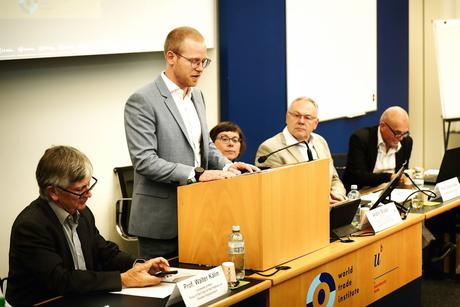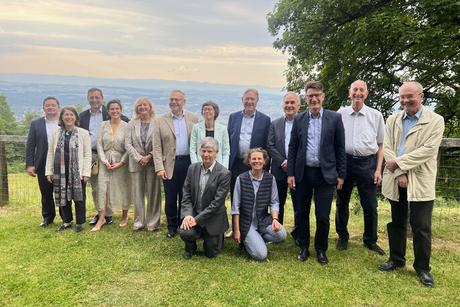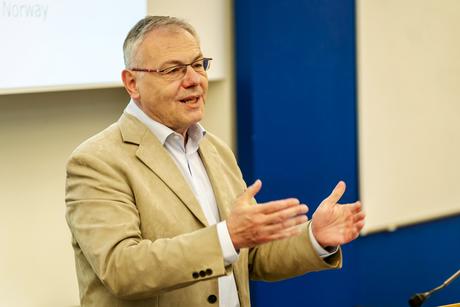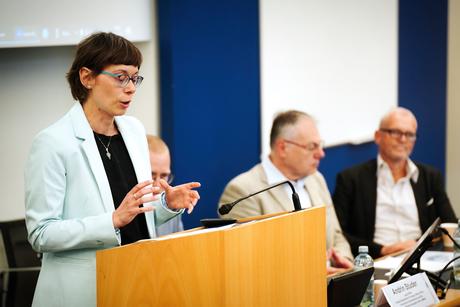Bern conference on sea level rise

On 9 June 2023, the FNI co-organised, together with the University of Bern World Trade Institute, an international conference on sea level rise.
On 9 June 2023, the FNI co-organised, together with the University of Bern World Trade Institute, an international conference on sea level rise. The conference, as well as the meeting of the Committee on International Law and Sea Level Rise held in conjunction with it on 10 June, were chaired by FNI Research Professor Davor Vidas. Held in Bern, Switzerland, this was yet another in a row of international conferences on sea level rise that the FNI set up together with universities and other institutions in several countries. Starting with the one held at the FNI in Norway in 2015, previous conferences co-organised by the FNI abroad were held in Lopud, Croatia, in 2017, in cooperation with TBA21, Madrid, Spain, in 2019, in cooperation with the Autonomous University of Madrid Faculty of Law; online in 2020 and 2021 during COVID-19 measures, in cooperation with the George Washington University Law School and the University of Hawaii Law School; and in Lisbon, Portugal, in 2022, in cooperation with the University of Lisbon Faculty of Law. These and other international conferences, such as dedicated sessions at the biennial conferences of the International Law Association (ILA) are related to the activities of the ILA Committee on International Law and Sea Level Rise which was established in 2012 and has been chaired by Research Professor Davor Vidas since.
During the course of this ten year period, timeliness of, and focus on, the international law implications of sea level rise has been growing and is now occupying the attention of many States and global and regional organisations alike. In February this year, the UN Security Council held a thematic session on security aspects of sea level rise. This was preceeded by the latest debate on international law and sea level rise in the Sixth (Legal) Committee of the UN General Assembly in late October and early November 2022, the fourth in a row of such annual debates at the UN between the Member States. These were triggered by the inclusion of the theme of international law and sea level rise in the work program of the UN International Law Commission in 2019. And in all these various forums and contexts, as well as in the views by several States expressed in these, the findings and recommendations of the FNI-led Committee on International Law and Sea Level Rise figured prominently.
Bern as a confernce venue this year was indeed an appropriate choice. The topic of sea level rise and its implications for preserving peace and security is currently a part of Switzerland’s thematic priorities during its membership in the UN Security Council (2023-2024). A representative of the Swiss Ministry of Foreign Affairs spoke at the opening of the conference.

Under the title ‘Sea level rise and its international law implications for legal certainty, stability and human rights’, the Bern conference assembled professors of international law from several countries, international judges and litigators, members of the UN International Law Commission, diplomats, researchers and students – including a whole class of geography students from the local college. The discussions focused on two key aspects of possible implications of sea level rise for international law: first, concerning the rights of affected populations; and second, regarding the law of the sea implications for maritime limits, zones, and boundaries.

“The overall objective of this latest, Bern conference, just as of several others we initiate so far, was to explore the role of international law in the context of climate change-induced sea level rise. This and the previous conferences have illustrated emerging challenges that will cause fundamental questions for international law, including the law of the sea, the protection of the affected populations in the coming decades, and even for preserving of statehood status of some affected states in a longer run. Core legal and political issues are likely to emerge as a consequence of not only Earth System changes such as sea level rise, but also their combination with the inherently territorial (static) basis of the present international law architecture. This will require adjustments through interpretation and development of international law, to enable adequate regulation of increasingly mobile (dynamic) aspects such as human mobility under increasingly changing conditions”,
said Research Professor Davor Vidas.

“There is hardly any contemporary topic of international law like sea level rise and the protection of affected populations where the intersection between natural sciences and social sciences is so prominent. From the local to the global level, we all face the challenge of understanding and analyzing environmental changes, not only with the aid of scientific methods, but also by relying on our accumulated knowledge of law and politics. This is a complex scenario where the intersection between natural sciences and social sciences is marked”,
said conference co-organiser, SNSF Professor Elisa Fornale.

Related previous FNI news
- FNI Research Professor Chairs ILA International Committee on Sea-level Rise
- Experts gather for FNI conference on climate change and sea-level rise
- Sydney: International Law Association adopts two resolutions on sea-level rise
- Sea-level rise and international law
- FNI at the Biennial Conference of the International Law Association (ILA) in Lisbon
